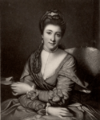Kitty Hunter facts for kids
Elizabeth Catherine Hunter (born around 1740, died 1795) was an important English lady, often called Kitty Hunter. She was the daughter of Thomas Orby Hunter, who was a member of parliament and a leader in the British navy. In 1762, she traveled to Europe with Henry Herbert, 10th Earl of Pembroke, which caused a big stir. They returned to England a year later, and Pembroke made up with his wife. Kitty Hunter had a son with Pembroke named Augustus, who was supported by Pembroke's family and became a navy officer. Later, Kitty Hunter married an army officer named Alured Clarke. When he became a knight, she became known as Lady Clarke.
Early Life
Elizabeth Catherine Hunter was born around 1740 and was known by her nickname "Kitty". Her father, Thomas Orby Hunter, became a member of parliament, which means he helped make laws for the country. He also became a lord of the Admiralty, a high-ranking position in the navy. Her mother was Jacomina Carolina Bellenden.
Kitty's father owned Crowland Abbey in Lincolnshire. During the Seven Years' War, he worked in Germany, supplying armies. He might have met Henry Herbert, 10th Earl of Pembroke, who was a major-general leading cavalry soldiers.
Pembroke returned from Germany in 1762. He met Kitty Hunter, who was a maid of honour at court and well-known in society. People at the time described Kitty as having "the face of a Madonna" and being "a handsome girl."
The Big Scandal
In February 1762, Kitty Hunter and Pembroke danced at a masked ball. They reportedly planned to travel to Europe together the next day. Pembroke left his wife, Elizabeth Herbert, Countess of Pembroke and Montgomery, to be with Kitty. His wife was known as one of the most beautiful women in England.
Kitty and Pembroke boarded a ship to Europe. However, a friend of Kitty's father, who commanded a private ship, stopped their boat. He brought them back to England. Kitty's father refused to see her, so the couple were allowed to board another ship for Europe. They ended up in Italy. Pembroke wrote to his wife from there, saying he thought it was best for them to separate. He even invited her to join him and Kitty in Europe. Elizabeth refused and moved to Blenheim Palace, her brother's estate.
Their trip to Europe became one of the biggest scandals of that time. People called it the "most scandalous marriage story of the age." A duchess named Emily FitzGerald wrote that Kitty's father was "quite distracted" and Pembroke's wife was "very unhappy." Later that year, some letters, supposedly between Pembroke and Kitty, were published as a book. A writer named Horace Walpole even wrote a short poem about the event.
Joshua Reynolds had painted Kitty Hunter in 1761. This painting showed Kitty on the night of the masked ball, holding a mask. Kitty Hunter and Pembroke had a son together. They named him Augustus Retnuh Reebkomp. "Retnuh" was his mother's last name spelled backward, and "Reebkomp" was a mixed-up version of Pembroke. After about a year, their relationship ended. Pembroke returned to England and made up with his wife.
Life After the Scandal
After returning to England, Kitty Hunter had a relationship with a naval officer named Augustus Hervey. He later became the 3rd Earl of Bristol.
Even after their relationship ended, Kitty stayed in touch with Pembroke. She visited his riding school at Wilton. She even appeared in some paintings Pembroke had made of himself and his friend Sir John Floyd, 1st Baronet, an army riding instructor. In one painting, Kitty appears disguised as a page.
Pembroke's family unofficially accepted his son with Kitty, Augustus. Pembroke wanted Augustus to use his family name, Herbert, but his wife disagreed. So, for a while, the boy was known as Reeb. Augustus joined the navy. When he became a captain, he was allowed to use the surname Montgomery, which was one of Pembroke's family titles. The Pembroke family supported Augustus well, giving him a lot of money each year.
Kitty Hunter herself received money from Pembroke, about £1,000 a year. This amount was lowered to £600 in 1771 when Kitty married Captain Alured Clarke, a British army officer. Kitty and Clarke did not have any children. Her allowance was reduced again in 1781 and stopped in 1790 when Clarke became a major-general. Alured Clarke later became a very high-ranking officer, a field marshal. After her husband was knighted, Kitty Hunter became known as Lady Clarke. Pembroke died in 1794 and left Kitty a payment in his will. Kitty Hunter died the following year, in 1795.
Images for kids
-
A mezzotint from a 1771 portrait by Edward Francis Cunningham
-
Portrait by Nathaniel Hone the Elder, 1780
 | Emma Amos |
 | Edward Mitchell Bannister |
 | Larry D. Alexander |
 | Ernie Barnes |





